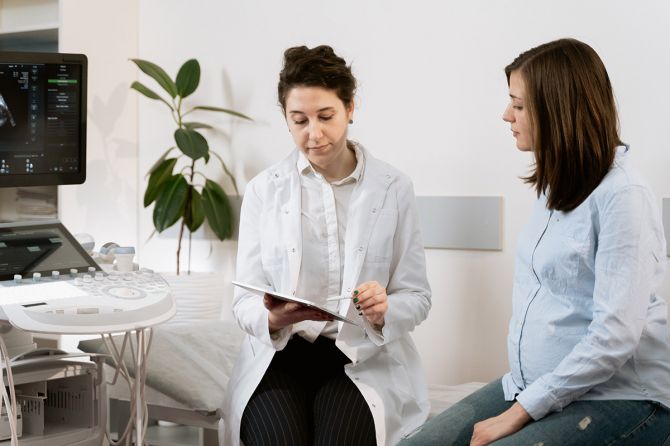Dr Bhumika Kotecha Mundhe, consultant obstetrician and gynaecologist, Masina Hospital, Mumbai, lists common health problems women ignore and explains why it could affect their overall health.

The biological conjure of a women predisposes her to certain health issues compared to men.
While for several women, healthy lifestyle takes a back seat amidst their daily routine, it's of utmost importance that they have a decent knowledge about their health conditions.
Though some issues might seem a tad too embarrassing to discuss, here are some important signs you shouldn't ignore:
1. Discharge
Normal emission is typically clear or milky and can have a subtle scent that's not unpleasant or foul smelling.
It's also important to grasp that discharge changes over the course of a woman's cycle.
However, if the colour, smell, or consistency seems quite different than usual, especially if you furthermore might have vaginal itching or burning, you will be addressing an infection or other condition which needs an appropriate treatment.
2. UTIs
Urinary tract infections (UTIs) are particularly common in women, as they have a shorter urethra than someone and thus bacteria have to travel a shorter length to realise the bladder.
Also, sometimes the vaginal infection may manifest with or without urinary symptoms. This definitely needs a treatment.
3. Vaginal dryness
Vaginal dryness could also be a painful symptom which could cause pain during sitting, standing, exercising, urinating (peeing) and sexuality. It’s commonly linked to menopause.
This symptom is going to be caused by a decrease in hormone levels, breastfeeding or certain medications.
Treatment options for vaginal dryness typically depend on the explanation behind the symptom.
4. Menstrual problems
Some of the commonly found menstrual problems are heavy, scant, missed and irregular periods. However, period cramps too form a really important part of the list.
In general, heavy menstrual bleeding is that the menstrual blood loss of quite 80 ml or periods lasting quite seven days. It needs evaluation of the underlying problem and suitable treatment accordingly.
5. PCOS
Polycystic ovary syndrome (PCOS/PCOD) is particularly caused by hormonal imbalance.
The foremost common symptoms found during this disorder are irregular and prolonged (maybe) menstrual cycles.
Other associated symptoms could even be weight gain, hair loss, darkening of the skin around nape of the neck.
The central aim of the treatment remains weight loss and lifestyle modifications within the kind of improved dietary habits and exercise.
6. Fertility issues
Infertility is after you cannot get pregnant after having unprotected, regular sex for six months to a minimum of one year, counting on your age.
Male infertility is as common as female infertility.
7. Carcinoma and self-breast examination
Breast self-exam, or regularly examining your breasts on your own, are often an important due to find a carcinoma early, when it’s more likely to be treated successfully.
The best time to undertake and do a monthly self-breast exam is about 3 to 5 days after your period starts.
A simple sign on the mirror by trying to find changes in skin texture, like dimpling, puckering, indentations, or skin that seems like a peel and inverted nipples.
This might be followed by examination with the middle of your fingers, gently yet firmly displace using small motions to seem at the full breast.
Any abnormality needs an opinion from your doctor.
8. Depression and status
It has been observed that the higher chance of depression in women is additionally related to changes in hormone levels that occur throughout a woman's life.
These changes are evident during puberty, pregnancy, and menopause, moreover as after birth or having a miscarriage.
Additionally, the hormone fluctuations that include each month's oscillation probably contribute to premenstrual syndrome (PMS) and premenstrual dysphoric disorder, (PMDD), a severe syndrome marked especially by depression, anxiety, and mood swings that happens the week before menstruation and interferes with standard of living.
9. Sexual health
Sexual health refers to a state of well-being that lets a woman fully participate in and luxuriate in sexual intercourse.
A spread of physical, psychological, interpersonal, and social factors influence a woman's sexual health.
For several women, contraception may be a important a component of sexual health.
Another is avoiding sexually transmitted diseases. These include gonorrhoea, syphilis, VD (vaginal discharge), chlamydia, human papillomavirus, and HIV/AIDS.
Employing a condom may be a key because of protect against getting a sexually transmitted infection
10. Cervical cancer and cytosmear
A Papanicolaou smear, also called a Papanicolaou test, is also a procedure to test for cervical cancer in women.
Detecting cervical cancer early with a cytologic specimen gives you a greater chance at a cure.
A cytosmear may detect changes within the cervical cells that suggest cancer may develop within the longer term. This test should be included in your check-ups.

Disclaimer: All content herein is written and published online for informational purposes only. It is not a substitute for professional medical advice. It should not be relied on as your only source for advice.
Please always seek the guidance of your doctor or a qualified health professional with any questions you may have regarding your health or a medical condition. Do not disregard the advice of a medical professional, or delay in seeking it because of something you have read herein.
If you believe you may have a medical or mental health emergency, please call your doctor, go to the nearest hospital, or call emergency services immediately. If you choose to rely on any information provided herein, you do so solely at your own risk.
Opinions expressed herein cannot necessarily provide advice to fit the exact specifics of the issues of the person requesting advice.









